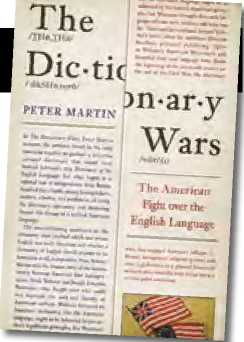Book Review
| Publication year | 2022 |
| Pages | 53 |
November, 2022

The Dictionary Wars
by Peter Martin
Reviewed by The Honorable Michael Leavitt
We are in the business of words and their meaning. A law professor once put it, Practicing law is just figuring out what words mean. That it. Good lawyers understand the meaning of words and even better lawyers can convince a court that the words mean what their client wants or needs them to mean.
When looking to determine a word meaning, courts often begin with a dictionary. See, e.g., GeoMetWatch Corp. v. Utah State Univ. Research Found., 2018 UT 50, ¶ 21, 428 P.3d 1064; Nicholson v. Jacobson Constr. Co., 2016 UT 19, ¶ 10, 374 P.3d 3; State v. Canton, 2013 UT 44, ¶ 13, 308 P.3d 517. Indeed, a starting point for a court assessment of ordinary meaning is a dictionary. O'Hearon v. Hansen, 2017 UT App 214, ¶ 25, 409 P.3d 85 (cleaned up).
Mindful of this, a suggested read from Amazon for The Dictionary Wars caught my attention. In it, author Peter Martin transports the reader to an infant United States and tracks the development of America’s identity through the lens of language and the establishment of a truly American dictionary. In the lives of most early Americans, the dictionary occupied a lofty place on the shelf right next to the Bible, with both seen as "twin and equally incontestable sources of authority, one secular and the other divine. "¦" Lexicographers of the day saw the publishing of a dictionary as more than a mere means of producing income but as a defense of the American way of life itself. The passion with which they defended their claims on the English language denoted a calling much greater than a mere occupation.
Prior to the American Revolution, the English language derived its spelling, pronunciation, and definitions largely from Englishman Samuel Johnson, regarded as the prime authority on the subject. Published in 1755, Johnson dictionary was considered by many as the final say as to the meaning of words. In fact, despite his unfavorable opinion of the American dialect as "an undisciplined and barbarous uncouthness of speech", even Americans "could not get enough of him".
After the birth of the new nation, Americans grappled with whether independence from Great Britain also meant independence from
The Dictionary Wars by Peter Martin Princeton University Press (2020) 376 pages Available in paperback, e-book...
To continue reading
Request your trial
